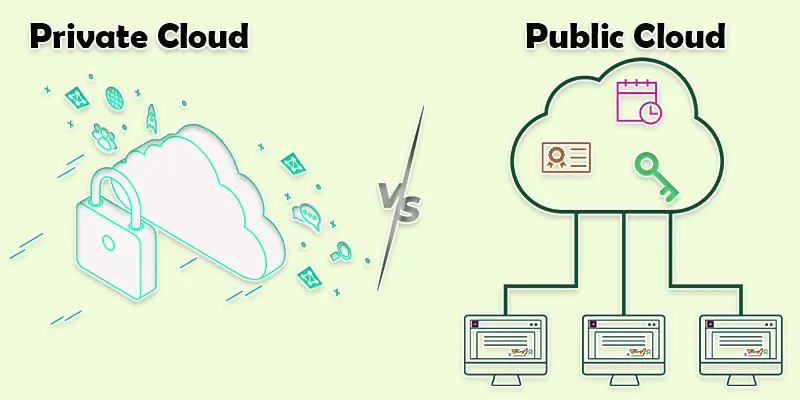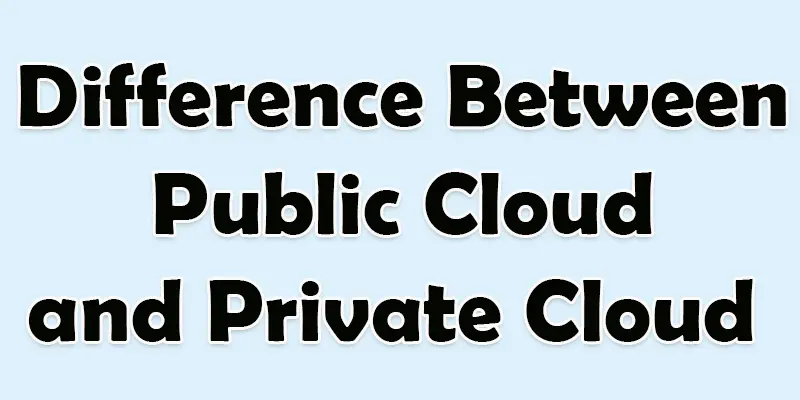Difference Between Public Cloud and Private Cloud | A Quick Guide
Published: 13 May 2025
Public Cloud vs Private Cloud
Public Cloud vs Private Cloud is a hot topic in the tech world over 90% of businesses now use some form of cloud service. But here’s the real question which one is right for you? Many people feel stuck choosing between cost, control, and security. Whether you’re setting up a new business or just curious about your options, this guide will clear things up.
Difference Between Public Cloud and Private Cloud
Who owns and manages the cloud and how it is used are the main distinctions between public and private clouds.

| Public Cloud | Private Cloud |
|---|---|
| Owned by a cloud service provider. | Owned by a single business or organization. |
| Open to many users. | Limited to one organization. |
| Pay-as-you-go, lower cost. | High upfront and maintenance costs. |
| Quick setup. | Takes time to build and configure. |
| Good but shared. | Strong, fully controlled by the company. |
| Limited. | Fully customizable. |
| Handled by provider. | Handled by the company IT team. |
| Easy to scale. | Can scale but takes planning. |
| May vary based on usage. | Consistent and reliable. |
| Less control. | Full control over data. |
| Startups, small businesses. | Large companies with sensitive data. |
| AWS, Google Cloud, Microsoft Azure. | VMware, OpenStack, IBM Cloud Private. |
| Off-site, provider’s data centers. | On-site or hosted privately. |
| Shared with others. | Dedicated resources. |
| Harder to meet strict rules. | Easier to meet industry standards. |
| Basic or premium (extra cost). | Custom, in-house support. |
| Good but depends on the internet and provider. | Highly reliable if managed well. |
| Done automatically by provider. | Done by the internal IT team. |
| Less flexible. | Highly flexible for company needs. |
| I need the internet to work. | May work offline within the company network. |
| Offered by the provider. | Company manages backups. |
| Higher due to shared space. | Lower, with private access only. |

Conclusion About Private Cloud vs Public Cloud
Public cloud vs Private cloud, I personally recommend starting with a public cloud if you’re a small to mid-sized business looking for flexibility and cost savings. However, if your company handles sensitive data or needs more control, a private cloud may be a better fit. In many cases, a hybrid approach can also offer the best of both worlds. Whatever path you choose, take time to assess your goals, budget, and security needs. Still unsure which one is right for you? Explore expert comparisons and talk to IT professionals to find the best fit for your business today.
FAQS
iCloud is a public cloud service by Apple. Anyone with an Apple ID can use it to store data online.
Yes, Gmail is part of the public cloud. Google provides it to everyone over the internet.
The main cloud for Android is Google Drive. It stores photos, files, and backups from Android devices.
Google One and iCloud offer cheap plans starting at around $1/month. It depends on your device and needs.
Google Cloud, Amazon Web Services (AWS), and Microsoft Azure are the top cloud platforms. The best one depends on your use case.
Big tech companies like Amazon, Google, Microsoft, and Apple own and control most cloud services.

- Be Respectful
- Stay Relevant
- Stay Positive
- True Feedback
- Encourage Discussion
- Avoid Spamming
- No Fake News
- Don't Copy-Paste
- No Personal Attacks

- Be Respectful
- Stay Relevant
- Stay Positive
- True Feedback
- Encourage Discussion
- Avoid Spamming
- No Fake News
- Don't Copy-Paste
- No Personal Attacks





